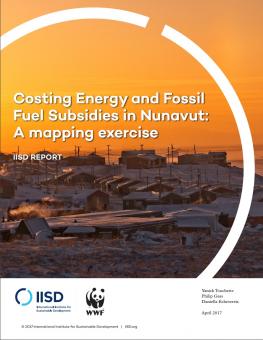
Costing Energy and Fossil Fuel Subsidies in Nunavut: A mapping exercise
This report, entitled Costing Energy and Fossil Fuel Subsidies in Nunavut, was commissioned by World Wildlife Fund Canada and undertaken by the International Institute for Sustainable Development.
Subsidies to offset the astronomical price of fossil-fuel-based energy cost the government of Nunavut more than $60 million annually,
$36.5 million of which goes toward diesel-based electricity generation, according to a new report that shows the extent to which diesel subsidies mask how economically beneficial renewable energy can be.
The report, entitled Costing Energy and Fossil Fuel Subsidies in Nunavut, was commissioned by World Wildlife Fund Canada and undertaken by the International Institute for Sustainable Development.
An earlier report on barriers to successful renewable-energy deployment in remote northern communities brought to light the need to accurately account for subsidies provided by various levels of government for diesel-fuel purchase, delivery, storage and power-generation infrastructure in the Canadian Arctic. That report — prepared by the Pembina Institute for WWF-Canada — noted that the true price of diesel is masked by multiple layers of subsidies that reduce the price to an artificial level, creating a barrier to adoption of renewable energy.
Across Canada, utility companies are tasked with keeping the lights on in their communities. Renewable energy is proven to be reliable, even in extreme climates, and research shows it can save some Arctic communities millions in ongoing costs, even with existing diesel subsidies. The savings would be even more significant if diesel subsidies were shifted to renewable-energy sources instead.
Megan Leslie, president and CEO of WWF-Canada, says:
“For the sake of our climate globally, and marine environments locally, we need to transition away from fossil fuels as quickly as possible, and we have the ideal opportunity to do so while building a more sustainable local economy. There is no reason for the government of Canada to continue funding the use of a fossil fuel that is not only damaging the environment and human health, but is also more expensive than a clean form of energy. Instead, federal funds should support communities as they develop reliable, sustainable energy sources.”
Paul Crowley, vice-president of Arctic conservation for WWF-Canada, says:
“Over the past two years we have seen increasing interest from Nunavummiut who want a safe, reliable, cost-effective energy system that lets them keep the lights on without putting the environment they depend on at risk. A hybrid renewable-energy system is possible. And even better, avoiding costly diesel will result in financial savings that could be used to fund other worthwhile programs in Nunavut. The government of Canada could kick-start this transition today using existing funding programs – such as the recently announced Arctic Energy Fund. We look forward to working with them and communities to bring these possibilities to life.”
This report is the latest in WWF-Canada's ongoing work to support remote northern communities as they explore the transition to habitat-friendly renewable power. Previous reports, in partnership with Pembina Institute and Waterloo Institute for Sustainable Energy, have respectively found that government fossil-fuel subsidies are a barrier to renewable energy investment and that investment in a mix of renewable energy in northern communities can lead to significant reductions in operations and maintenance costs and carbon dioxide emissions.
Switching to renewable energies improves northern communities by:
- Providing a cost-effective way to reduce reliance on fossil fuels.
- Ensuring the Arctic environment isn’t harmed by fuel spills from resupply ships and on land.
- Increasing independence for remote communities in the North.
Description provided by WWF Canada.
Participating experts
Funded by
You might also be interested in
How Fossil Fuels Drive Inflation and Make Life Less Affordable for Canadians
New report takes closer look at how Canada’s dependence on fossil fuels impacts energy costs and prices of essentials such as transportation, home heating, and housing.
IISD Applauds Canada’s Reaffirmation to End Domestic Public Finance for Fossil Fuels in Budget 2024
Today's federal budget announcement delivers new measures to support affordability and reaffirms Canada’s commitments on climate action.
The Cost of Fossil Fuel Reliance
Government support for fossil fuels reached at least USD 1.5 trillion in 2023, new data shows.
Increased Support Needed to Achieve India's Clean Energy Goals
India is on track to achieve many of its 2030 clean energy goals but needs to step up government support measures to accelerate the deployment of offshore wind, electric vehicles, and green hydrogen, according to a new report.